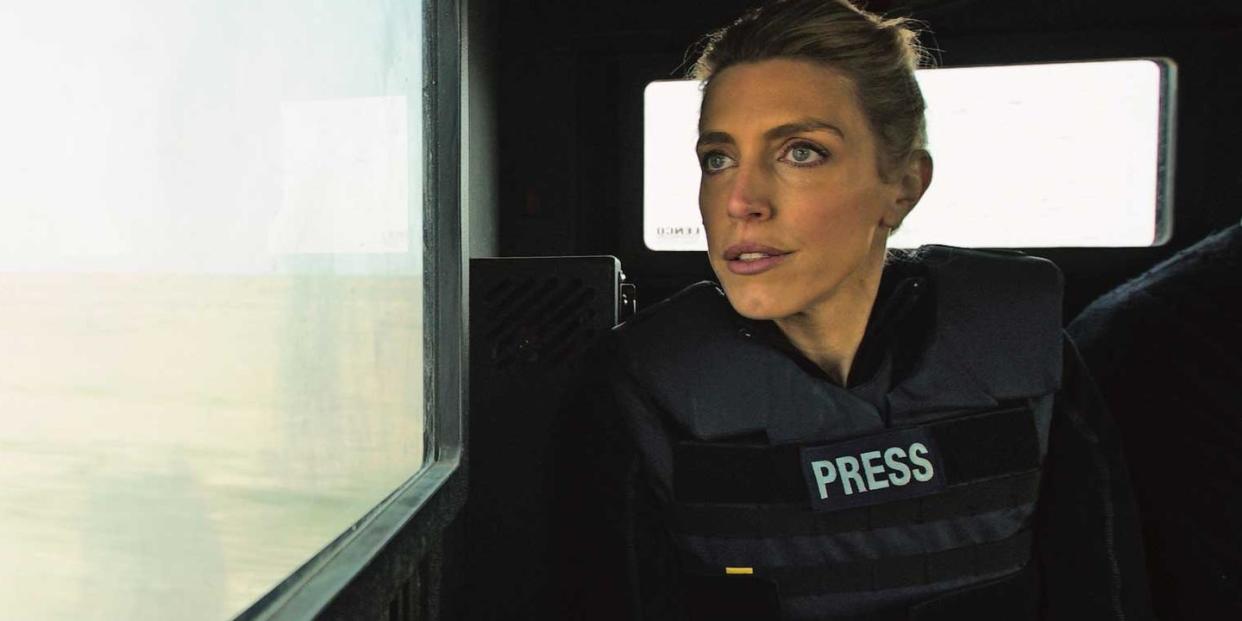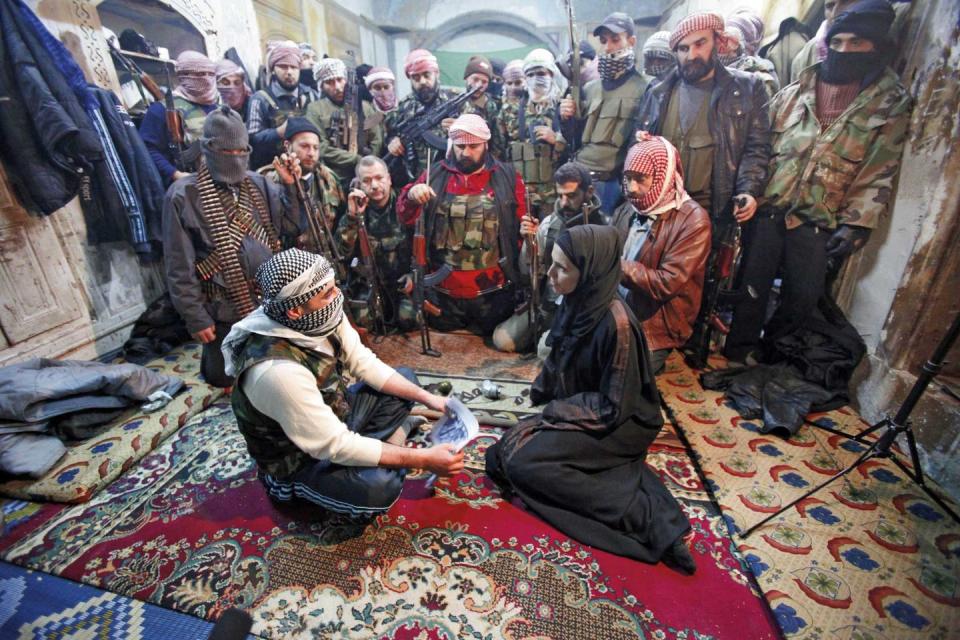Pregnant on the Front Lines


I had always viewed becoming a mother as perhaps the least extraordinary thing a woman could do. This was not to say that I didn’t want to have children—I did very much—but I was wary of the consequences, of becoming obsessive about diet and back problems, the endless conversations about strollers, teething, the right kindergarten. It all just seemed so dull.
So when I learned I was pregnant, two years after accepting an international correspondent job with CNN’s London bureau in 2015, I was determined to be different, to take pregnancy and childbirth in stride. I didn’t broadcast the news to my colleagues right away. It was too early to be confident the pregnancy would advance, but I was also a little apprehensive about how it might change everyone’s perceptions of me. My secret did, however, make an assignment in Greenland for a documentary on climate change a little tricky.
When we arrived at the apex of the country’s ice sheet—a research center called Summit Station, where a balmy summer night might mean minus 10 degrees centigrade—our guide told us we would be sleeping in tents. I laughed out loud. But the next thing I knew, I was cradling an Arctic sleeping bag and getting ready for a night under canvas on top of the world, literally if not metaphorically. Besides the altitude and poleaxing cold, I had to cope with a common side effect of pregnancy: the frequent and urgent need to urinate. Our survival kit included two bottles. One was marked “Water”; the other was for peeing. While hardly appealing, it beat the thought of leaving the warmth of a sleeping bag and trudging to an outhouse across the snow.

On my first night, I realized at about 2 a.m. that I had to go. After a few minutes of mentally preparing myself, I unzipped my sleeping bag. The air was like freezing needles against my body. I hastily took the bottle to the corner of the tent, pulled down my pajama bottoms, and began peeing. Without going into too much detail, let me just say that peeing into a bottle in the dark as a woman is an art form, and one I didn’t master immediately. One of my socks was soaked by the end, and I had to peel it off before closing the bottle and zipping myself back into the sleeping bag, rubbing my hands feverishly against my arms and legs to try to warm them.
I managed to nod off for a couple of hours before needing to pee again. I opened the sleeping bag, swearing at the cold as I went to empty the bottle. Unfortunately, the contents had frozen solid. I tried warming it under my armpit, to no avail. I unzipped the tent to see how far away the outhouse was. A gust of freezing air hit me; no way was I stepping into that. I zipped the tent back up and grabbed the bottle with “Water” written on it. Let’s just hope I don’t get thirsty, I thought.
The condensation from my breath was freezing on the scarf I had wrapped around my head, and I could feel the icy crystals pricking my skin. I was exhausted (a common side effect of pregnancy, especially in the first trimester) but couldn’t sleep (a common side effect of being at a high altitude). My mind was racing. I didn’t want pregnancy to change the way I worked or lived, and yet it was already clear that there were big changes happening in my body.
“Dear God, please let my baby be okay,” I whispered into the frigid air. “Please don’t let the cold or the altitude hurt him—or her.” I felt a flutter of panic in my chest thinking about how my colleagues would react when they found out. I remembered all too well how cavalier I had been when discovering other women working in combat zones were expecting. “I guess I won’t be seeing her around anymore,” I’d say.
A post shared by Clarissa Ward (@clarissawardcnn) on Oct 20, 2017 at 2:53am PDT
As if to punish myself, and for reasons I don’t quite understand to this day, I went directly from the ice sheet to Saint Martin in the Caribbean to cover the aftermath of Hurricane Irma. We ate canned food and washed with bottles of seawater. After I’d been there for three days, my husband, Philipp, sent me an article saying that Saint Martin had mosquitoes with Zika virus, which can be very dangerous for pregnant women. “It’s a bit late now,” I replied.
A post shared by Clarissa Ward (@clarissawardcnn) on Sep 17, 2017 at 12:20am PDT
From the Caribbean, I lobbied to travel to the border between Bangladesh and Myanmar, where more than half a million Rohingya Muslims had fled a brutal crackdown by the Burmese military and paramilitary forces. I felt it wasn’t getting the media attention it deserved. It was perhaps too remote, too difficult to explain.
By this point, my pregnancy was five months along, and my bosses were a little surprised that I wanted to undertake such a taxing assignment, but they didn’t object—so long as I had all the proper vaccines and was confident the trip could be done sensibly. It was as if I was trying to cram in as much reporting as possible before my final trimester. I couldn’t quiet the niggling fear in the back of my mind that if I slowed down, I would become irrelevant. It’s an affliction common with television correspondents, who often joke that “you’re only as good as your last live shot.”

Upon arriving in the coastal city of Cox’s Bazar, its name a legacy of its colonial past, I was struck by Bangladesh’s seemingly untouched beauty. There were vast, empty beaches fringed by palm trees and bright emerald-green rice paddies. The air was warm and humid and smelled of the sea. From there, we headed to the sprawling, squalid camp that had sprung up along the border to house the refugees. You could walk for two hours and still not reach the middle of it. A handful of clinics and schools run by aid workers did not even begin to meet the scale of the need.
In one tent, a mother described the moment her two-year-old son was ripped from her arms by soldiers and thrown into a fire as she lay on the floor, semiconscious. Another young woman told us that she and four other Rohingya women were dragged into a hut and raped by soldiers who then stabbed them. She survived by pretending to be dead. “It would be good if I had died,” she whispered to the translator, “because then I wouldn’t have to remember all these things.”
The day before we left, I met a recent arrival, a woman who’d been traveling for two days while seven months pregnant. She had no food or money and looked emaciated. I thought briefly of my carefully choreographed birth plan and maternity leave. Where would this woman give birth? I wondered. Who would look after her?
By the time I got back to London, my neat round bump was not so little anymore. I was six months gone, and according to the scans, the baby was healthy and normal. I was bursting with love and excitement yet full of trepidation. A recurring dream from that time involved leaving the baby in a taxi.

One day, Philipp and I decided to bite the bullet and buy some stuff for the nursery. Neither of us were good “baby shoppers.” We felt inept in the presence of so many couples who’d studied assiduously, but we headed hesitantly toward the strollers.
“What brand did your friends recommend?” Philipp asked, his head already aching at the dizzying amount of merchandise on display.
“The Bugaboo,” I said, looking down at the price tag of one. Eight hundred pounds. I nearly jumped.
“But what’s the difference between them?” he asked. “There’s like a dozen.”
“How the hell should I know?” I hissed.
The store was stifling hot. My scarf was practically strangling me. What if, after 12 years of jumping out of helicopters in war zones and learning languages and meeting people from all different walks of life, I was now just another privileged, pregnant white lady looking at over-priced strollers in a generic department store? I thought about a blog post a friend had sent me: “The Birth of a Baby Is Also the Birth of You.” What did that even mean? What about the old me? What happens to her? Does she die?
“Let’s just get this one,” I said, pointing to a navy blue Cameleon Classic.
“Fine,” Philipp said.
It was probably my fear of the mundane, mixed with apprehension about my capacity for motherhood, that pushed me to make one more big trip before my already very indulgent bosses drew the line. It wouldn’t look good for CNN if one of its senior correspondents was abducted or hurt weeks before she was due to give birth.
For months I’d wanted to go back to Yemen, where a civil war had brought the country to the brink of famine, and from where I’d last reported during the summer of 2015. It was almost impossible to get there because Saudi Arabia and the United Arab Emirates had imposed a near-total blockade on the country. Their stated objective was to try to oust Iran-backed Houthi rebels who had taken control of the capital and much of the northwest region. But after more than two and a half years of the blockade, the Houthis still held sway in large parts of Yemen—and people in the country were starving to death.
One of CNN’s best London-based producers, Salma Abdelaziz, had been working for weeks on ways to get into Yemen. A young Egyptian American, she’d been in Syria with me, and I trusted her implicitly. She was bright, tenacious, and incredibly calm in stressful situations. Eventually she found a way to get to the largest city in southern Yemen, the port of Aden. It was controlled by UAE forces, but she’d managed to befriend someone who could help grease the wheels for us.
It was a fantastic opportunity to tell a story that was largely being ignored in the media. When I told Philipp I wanted to go, he frowned. It was dangerous, he argued; there was a war going on, there was disease, the hospitals were terrible. But that’s exactly why I have to go, I explained. Eventually, he came around. “But remember,” he said, “this isn’t just about you anymore.” I nodded emphatically, without really processing what he was saying.
Our first mission was to visit the main state-run hospital. Salaries hadn’t been paid in months, and the building was filthy and dilapidated. An English-speaking doctor with exhausted red-rimmed eyes showed us around. I noticed how she winced with embarrassment as our cameras spotted her rinsing her hands with bottled water in the neonatal ward (there was no soap or running water to wash them properly).

In the intensive care unit, we met three-year-old Khadir, who was suffering from a severe lung infection. His eyes were closed, his chest heaving with the effort of taking in air. I peered into a small trash can at the bottom of his bed. It was full of emptied bags of blood and discarded needles. A fan was spinning limply in a futile effort to clear the warm, fetid air. Flies settled on Khadir’s face and hands. His mother, Yamal, tried in vain to swat them away before slumping over his bed in defeat.
I quietly sat down next to her. He had been sick for weeks, she told me, but the journey from their home in the province of Abyan was long. And with fuel a scarce commodity, travel was prohibitively expensive. “Alham-dulillah, praise God, he is doing much better,” she said. I looked at his swollen eyes and labored breathing and nodded, unconvinced.
Khadir died the next day. There was no ventilator to help him breathe, no proper medicine to help him fight the infection. He died because his mother couldn’t afford to get him to the hospital quickly enough.
I had been experiencing anxiety attacks throughout the trip because my baby wasn’t kicking as much. The internet in the villa where we were staying was sporadic, so I called Philipp and asked him to research reduced movements. “Placental abruption...” he readout from a list.
“Placental abruption??” I shouted hysterically.
He quickly assured me that I’d be experiencing all sorts of other symptoms if that were the case, and suggested I lie down on my left side and drink something sweet. I had no idea whether this was an old wives’ tale or something he culled from the British Medical Journal. I drank a Pepsi and lay on my sleeping bag. “Where are you, my love?” I whispered. “Give me a kick so I know you’re okay.” After some time, I felt a squirm inside of me, then a gentle kick. I wept with relief and ached with love for this mysterious creature whom I had never met. I suddenly fully understood what Philipp had meant. It wasn’t about me anymore. I was a vessel. And it was a privilege.
Adapted from On All Fronts by Clarissa Ward. Published by arrangement with Penguin Press, a member of Penguin Random House LLC. Copyright © 2020 by Clarissa Ward.
This article originally appeared in the May 2020 issue of ELLE.
You Might Also Like
